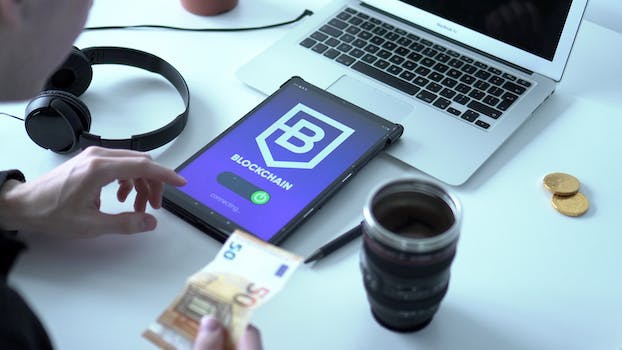
The Role of Blockchain Beyond Cryptocurrencies: Applications and Potential
-
Table of Contents
- Introduction
- Exploring the Potential of Blockchain for Supply Chain Management
- How Blockchain Could Revolutionize the Healthcare Industry
- The Role of Blockchain in the Financial Services Industry
- Blockchain and the Future of Smart Contracts
- Blockchain and the Internet of Things: What’s the Connection?
- Q&A
- Conclusion
“Unlock the Power of Blockchain: Unlock the Possibilities Beyond Cryptocurrencies!”
Introduction
The blockchain technology has revolutionized the way we think about digital transactions and data storage. Initially developed as the underlying technology for cryptocurrencies such as Bitcoin, blockchain has since been adapted for a variety of other applications. This article will explore the potential of blockchain beyond cryptocurrencies, looking at its applications in areas such as finance, healthcare, and government. We will also discuss the potential of blockchain to revolutionize the way we think about data storage and digital transactions.
Exploring the Potential of Blockchain for Supply Chain Management
The potential of blockchain technology for supply chain management is immense. Blockchain is a distributed ledger technology that enables secure, transparent, and immutable transactions. It has the potential to revolutionize the way supply chains are managed, making them more efficient, secure, and cost-effective.
Blockchain technology can be used to track the movement of goods and materials throughout the supply chain. By using a distributed ledger, all parties involved in the supply chain can have access to the same information, ensuring that everyone is on the same page. This can help reduce delays and errors, as well as improve the accuracy of data.
Blockchain can also be used to improve the security of supply chains. By using cryptographic algorithms, blockchain can ensure that data is secure and immutable. This can help protect against fraud and malicious actors, as well as ensure that data is not tampered with.
In addition, blockchain can be used to streamline the payment process. By using smart contracts, payments can be automated and securely processed. This can help reduce costs and improve efficiency.
Finally, blockchain can be used to improve transparency in the supply chain. By using a distributed ledger, all parties involved in the supply chain can have access to the same information. This can help ensure that everyone is on the same page and that all parties are held accountable.
Overall, the potential of blockchain for supply chain management is immense. By using a distributed ledger, blockchain can help improve the efficiency, security, and transparency of supply chains. This can help reduce costs and improve the overall performance of the supply chain.
How Blockchain Could Revolutionize the Healthcare Industry
The healthcare industry is on the cusp of a revolution. With the emergence of blockchain technology, the industry is poised to experience a major transformation. Blockchain technology has the potential to revolutionize the healthcare industry by improving data security, streamlining processes, and reducing costs.
Data security is a major concern in the healthcare industry. With the rise of cyberattacks, healthcare organizations must take steps to protect patient data. Blockchain technology can help by providing a secure, distributed ledger that stores data in an immutable format. This means that data stored on the blockchain cannot be altered or deleted, making it virtually impossible for hackers to access sensitive information.
Blockchain technology can also streamline processes in the healthcare industry. By using smart contracts, healthcare organizations can automate administrative tasks such as claims processing and billing. This can reduce the amount of time and money spent on manual processes, allowing healthcare organizations to focus on providing better care to patients.
Finally, blockchain technology can help reduce costs in the healthcare industry. By eliminating the need for intermediaries, blockchain technology can reduce the cost of transactions and administrative tasks. This can help healthcare organizations save money and pass on the savings to patients.
The potential of blockchain technology to revolutionize the healthcare industry is undeniable. With its ability to improve data security, streamline processes, and reduce costs, blockchain technology could be a game-changer for the healthcare industry. It is only a matter of time before we see the full potential of this technology in the healthcare industry.
The Role of Blockchain in the Financial Services Industry

The financial services industry is undergoing a major transformation due to the emergence of blockchain technology. Blockchain is a distributed ledger technology that enables secure, transparent, and immutable transactions. It has the potential to revolutionize the way financial services are conducted, from payments to trading and investments.
Blockchain technology can be used to streamline and automate many of the processes that are currently manual and time-consuming. This can reduce costs and improve efficiency. It can also reduce the risk of fraud and errors, as all transactions are recorded and stored on the blockchain.
Blockchain can also be used to create new financial products and services. For example, it can be used to create digital currencies, such as Bitcoin, which can be used for payments and investments. It can also be used to create smart contracts, which are self-executing contracts that can be used to automate transactions.
Blockchain can also be used to create new types of financial instruments, such as digital tokens. These tokens can be used to represent assets, such as stocks, bonds, and other financial instruments. This can make it easier for investors to trade and invest in these assets.
Finally, blockchain can be used to create new types of financial services. For example, it can be used to create decentralized exchanges, which are exchanges that are not controlled by any single entity. This can make it easier for investors to trade and invest in different assets without having to go through a centralized exchange.
Overall, blockchain technology has the potential to revolutionize the financial services industry. It can reduce costs, improve efficiency, reduce the risk of fraud and errors, and create new financial products and services. As the technology continues to evolve, it is likely that it will become an integral part of the financial services industry.
Blockchain and the Future of Smart Contracts
The blockchain technology has revolutionized the way we do business. It has enabled us to create secure, transparent, and immutable digital records of transactions. This technology has also enabled us to create smart contracts, which are digital contracts that are self-executing and self-enforcing.
Smart contracts are digital contracts that are written in code and stored on the blockchain. They are designed to automatically execute when certain conditions are met. This means that they can be used to automate a wide range of transactions, from financial transactions to legal agreements.
Smart contracts have the potential to revolutionize the way we do business. They can be used to automate a wide range of transactions, from financial transactions to legal agreements. They can also be used to create new types of digital assets, such as digital tokens.
Smart contracts are also more secure than traditional contracts. They are stored on the blockchain, which is an immutable and secure ledger. This means that they cannot be altered or tampered with. This makes them ideal for use in a wide range of applications, from financial transactions to legal agreements.
The future of smart contracts is bright. As the technology continues to evolve, we can expect to see more applications for smart contracts. They can be used to automate a wide range of transactions, from financial transactions to legal agreements. They can also be used to create new types of digital assets, such as digital tokens.
Smart contracts are the future of business. They are secure, transparent, and immutable. They can be used to automate a wide range of transactions, from financial transactions to legal agreements. They can also be used to create new types of digital assets, such as digital tokens. As the technology continues to evolve, we can expect to see more applications for smart contracts in the future.
Blockchain and the Internet of Things: What’s the Connection?
The Internet of Things (IoT) and blockchain technology are two of the most talked-about topics in the tech world today. While they may seem unrelated, the two are actually closely intertwined. In this blog post, we’ll explore the connection between blockchain and the Internet of Things and how they can be used together to create powerful solutions.
At its core, blockchain is a distributed ledger technology that enables secure, transparent, and immutable transactions. It is a decentralized system that allows for the secure transfer of digital assets without the need for a third-party intermediary. This makes it an ideal technology for the Internet of Things, which is a network of connected devices that can communicate with each other and exchange data.
The combination of blockchain and the Internet of Things can be used to create powerful solutions for a variety of industries. For example, blockchain can be used to securely store and transfer data between IoT devices, allowing for more efficient and secure communication. Additionally, blockchain can be used to create smart contracts that can be used to automate processes and transactions between IoT devices.
The combination of blockchain and the Internet of Things can also be used to create secure and transparent supply chain solutions. By using blockchain, companies can track the movement of goods from the point of origin to the point of delivery, ensuring that the goods are delivered on time and in the right condition.
Finally, blockchain and the Internet of Things can be used to create secure and transparent payment solutions. By using blockchain, companies can securely store and transfer digital assets, allowing for faster and more secure payments.
In conclusion, blockchain and the Internet of Things are two powerful technologies that can be used together to create powerful solutions for a variety of industries. By combining the two, companies can create secure and transparent solutions that can help them streamline their operations and increase their efficiency.
Q&A
1. What is blockchain technology?
Answer: Blockchain technology is a distributed ledger system that records and stores data in a secure, immutable, and transparent way. It is a decentralized system that allows for secure and transparent transactions between two or more parties without the need for a third-party intermediary.
2. What are some potential applications of blockchain technology?
Answer: Blockchain technology has potential applications in a variety of industries, including finance, healthcare, supply chain management, government, and more. It can be used to securely store and transfer data, facilitate smart contracts, and enable digital identity management.
3. How does blockchain technology work?
Answer: Blockchain technology works by creating a distributed ledger system that records and stores data in a secure, immutable, and transparent way. It is a decentralized system that allows for secure and transparent transactions between two or more parties without the need for a third-party intermediary.
4. What are the benefits of using blockchain technology?
Answer: The benefits of using blockchain technology include increased security, transparency, and efficiency. It also eliminates the need for a third-party intermediary, reduces costs, and enables faster transactions.
5. What are some of the challenges associated with blockchain technology?
Answer: Some of the challenges associated with blockchain technology include scalability, privacy, and regulatory issues. Additionally, there is a lack of understanding and expertise in the technology, which can make it difficult to implement.
Conclusion
In conclusion, blockchain technology has the potential to revolutionize many industries and processes. It has already been used to create cryptocurrencies, but its potential goes far beyond that. Blockchain technology can be used to create secure, transparent, and efficient systems for a variety of applications, including digital identity, healthcare, supply chain management, and more. As the technology continues to evolve, it is likely that more and more applications will be developed, and the potential of blockchain technology will be fully realized.






